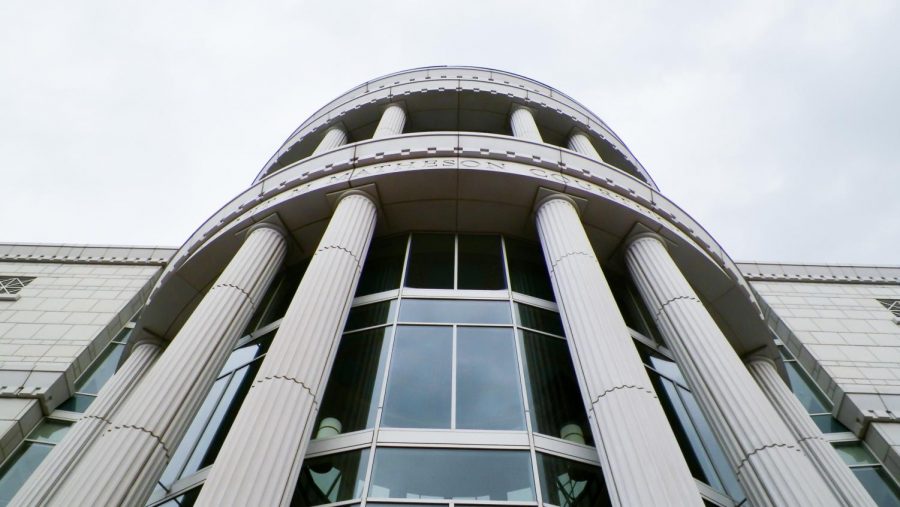Alexander: Ahmaud Arbery’s Case Feels Hopeless
Scott M. Matheson Courthouse | 2020 Photo by Hailey Danielson | The Daily Utah Chronicle
November 18, 2021
Trying the killers of Ahmaud Arbery is officially underway, more than a year after the horrifying incident. Arbery, a 25-year-old Black man, was out jogging when Gregory McMichael and his son, Travis McMichael, shot and killed him on Feb. 23rd of 2020. They suspected that Arbery committed break-ins in their neighborhood and claimed they went after him to carry out a citizen’s arrest.
The McMichaels armed themselves with guns and attempted to cut Arbery off with their pickup truck. Arbery attempted to escape the deadly situation, but Travis shot and killed him. William Bryan, a neighbor of the McMichaels, captured footage of the ordeal, and the infuriating modern-day lynching of Arbery prompted nationwide protests.
This past October, the defense team of Arbery’s killers successfully secured a jury of 11 white people and 1 Black person to guarantee a favorable outcome for Bryan and the McMichaels. With the help of Judge Timothy Walmsley, the defense removed 11 of 12 prospective Black jurors over doubts they “could not be objective.”
Despite Judge Walmsley’s approval of the Black jurors’ ability to evaluate evidence fairly, the defense disguised their racially motivated exclusion as “race-neutral.” This is not the first time someone involved in the Arbery case cheated justice. This isn’t even the second time. Judging by the racist practices that keep happening in this case, we must brace ourselves either for a mistrial or a verdict that fails to reflect justice.
Since the McMichaels’ initial decision to chase down and kill Arbery, the case has been riddled with injustices. Upon arriving at the scene, police officer Ricky Minshew refused to administer first aid over “fears of his safety,” despite Arbery lying in a pool of blood, suffering from three shotgun wounds.
The prosecutor at the time, Jackie Johnson, instructed officers not to make any arrests because of her prior connection with Gregory McMichael, a former police officer. For two months, no arrests were made. Then, after Bryan’s video was revealed and sparked national outcry, Johnson was fired and replaced by prosecutor George E. Barnhill, who argued there was “not sufficient cause” to arrest the McMichaels. Only after the case was handed to Georgia’s Bureau of Investigations were the McMichaels finally arrested.
Arbery was unarmed and a threat to nobody. The McMichaels’ decision to kill Arbery was not an act of self-defense but a hate crime. The Glynn County Police Department’s attempt to cover it up failed when the situation was brought to the national spotlight. How can our criminal justice system remain fair and unbiased with injustices like this going unnoticed until white people choose to make it important?
Following Arbery’s death, the nation was again forcefully reminded of the criminal justice system’s inequality. The deaths of George Floyd, Breonna Taylor and other unarmed Black people ignited Black Lives Matter protests and nationwide media coverage. Companies and people were all about diversity and standing in solidarity with Black people. But that didn’t last long, and it certainly didn’t result in lasting change. If it did, there would be more Black jurors sitting on the Arbery case.
The state of Georgia did pass a hate crimes law and repealed their citizen’s arrest law due to Arbery’s murder, but none of Arbery’s killers are being tried under the new law. Instead, they are being tried on the old citizen’s arrest law because Arbery’s death occurred when the law was still in place.
The old citizen’s arrest law has roots in the Fugitive Slave Act of 1850, where white citizens were encouraged to capture fleeing slaves as a “citizen’s arrest.” Despite the abolition slavery, the McMichaels took it upon themselves to carry on this racist legacy, killing Arbery. And with the McMichaels being tried on the citizen’s arrest law, the defense will try to justify Arbery’s death.
If true justice was served, the McMichaels and Bryan would be tried under the new hate crimes law. If true justice was served, the McMichaels would have been arrested immediately, and there would be 3 Black jurors and 9 White jurors to reflect the demographics of Georgia. If true justice was served, Arbery would still be alive.
The injustice of the Arbery case, from the McMichaels’ delayed arrest to jury selection, demonstrates the problems in our criminal justice system. With jury selection alone, the defense was able to cherry-pick the jury to reflect the demographics of their clients, thereby ensuring that Arbery’s case will not be fair.
Don’t expect Arbery’s case to equate to the justice served in Floyd’s case. The racism in our criminal justice system is just as prevalent today as it was during slavery. We saw how the McMichaels, Bryan and the prosecutors evaded justice. It was only after the case and its details were brought to the national spotlight that Arbery’s killers were caught. And with jury selection and the initial proceedings of the case, I’m afraid this case will not bode well for people seeking justice for Arbery.
Our fight for justice will never be over as long as Jim Crow laws infiltrate the criminal justice system. Arbery was at the mercy of Gregory and Travis McMichaels, reflecting how in this nation, Black lives remain at the mercy of their white counterparts.









John Hedberg • Nov 24, 2021 at 5:24 am
CJ,
I think you rightly surmise that bigotry against a whole stereotyped group of people (“black people”) is wrong, which we can all agree on, but then you go on to express bigotry against a whole stereotyped group of people (“white people”) which is also just as incorrect, both factually, since no group of people is even remotely homogenous, but also morally and ethically, since these incorrect stereotypes mixed with the distortions of bigotry nearly always result in harm being done to innocent people.
There are no black people. There are no white people. There are only people, brothers and sisters, equally beloved children of the same Infinite Love, beautiful but imperfect, fallible but full of potential, which is almost the definition of the childhood we all share here together in life & breath.
When some among us fall down, as we all inevitably do, we don’t celebrate that. We understand it, we learn and grow from it as we heal, and we Love one another in gratitude for the fact that our own and each others’ errors can be overcome by that Greater Love as we mature. Meanwhile, we do celebrate how far we’ve come together, and we do celebrate each others’ successes and rights of passage, and in this we maintain a sense of gratitude and joy we share with that same Infinite Love which made us and looks on with laughter, tears, and wonder as we slowly unlock and express all the potential that was born within us to flourish.
With tears for those who have presently fallen, celebrate with all of us (E Pluribus Unum) that wonderful Providence and Thanksgiving which heals and unlocks every good thing we share and look forward to, together, as people and family.
In that Love, All the Best~!
J Hedberg